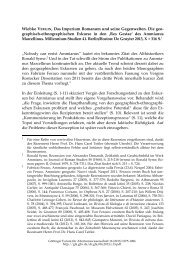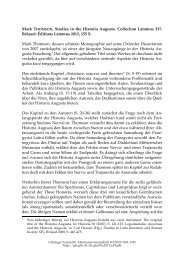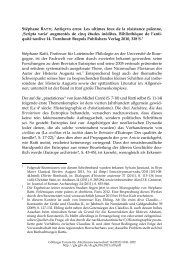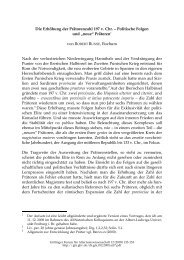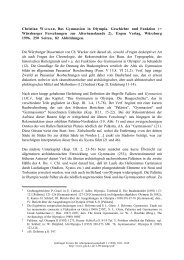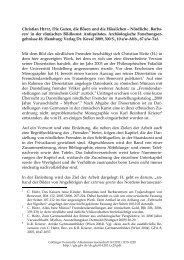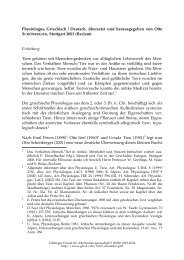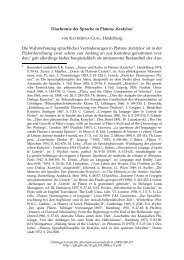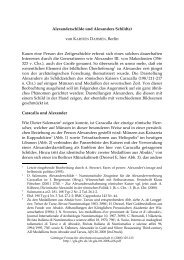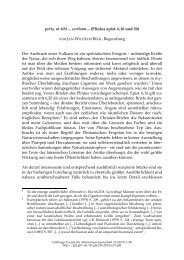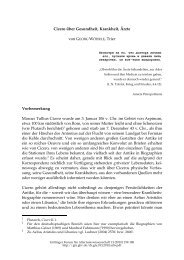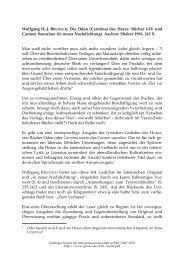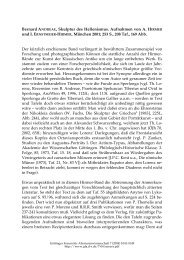The Bee Simile - Göttinger Forum für Altertumswissenschaft
The Bee Simile - Göttinger Forum für Altertumswissenschaft
The Bee Simile - Göttinger Forum für Altertumswissenschaft
Create successful ePaper yourself
Turn your PDF publications into a flip-book with our unique Google optimized e-Paper software.
136 Wolfgang Polleichtner<br />
<strong>The</strong> bees visit the lilies as we have said. Because the meadow is introduced<br />
into the picture almost as a third party besides lilies and bees, the smile of the<br />
meadow may be an indicator of the joy that Apollonius expects to create in his<br />
reader with his Lemnian episode. 143 This would be the humorous end to what<br />
had a curious trace of humoristic details. 144<br />
Utterly forgotten is the task for which the Argonauts gathered and undertook<br />
their voyage. This is pointed out by Heracles in a very interesting way: “Let<br />
him (sc. Jason) stay all day in the beds of Hypsipyle until he has populated<br />
Lemnos with male children and earned himself great glory.” Whether Jason,<br />
please excuse my bluntness, could ever achieve by monogamous behavior<br />
what Heracles – certainly by overstating the matter 145 – suspects him to have<br />
in mind only is a valid question. 146 <strong>The</strong> plural for “beds” is probably telling.<br />
<strong>The</strong> answer to this question reveals Heracles’ sharp tongue and his rather curious<br />
character, and it also contains a moral rebuke for every one of the Argonauts<br />
who has participated in Jason’s deeds. As a result, the Argonauts feel<br />
ashamed. <strong>The</strong>y would not need to feel ashamed if they did not feel – and were<br />
not – guilty of what they are accused. However, as far as we can infer from<br />
Hypsipyle’s words, she does not accuse him of “adultery” or vice versa. But<br />
does Heracles’ statement have to be an overstatement only – especially in regard<br />
to the Argonauts who feel ashamed? Consider this as well: Would the<br />
number of sailors on one ancient ship be sufficient to provide every woman in<br />
Carthage with a husband? 147 We do not have to blame Apollonius for a simile<br />
that does not describe the reality of the narrative if we bend the truth of that<br />
reality first. 148 Heracles blows a horn whose tune has been heard earlier. This<br />
Apollonius’ work. See e.g. C.R. Beye (1969) esp. 43ff., 47-54 and (1982) 93; T.M. Klein<br />
(1983) 116f.; R. Hunter (1988) 436 n. 4; S. Jackson (1992) 155.<br />
143 <strong>The</strong> meadow is the viewer of the scene just like various gods in Argonautica 4,953-960; cf.<br />
E. Phinney (1967) 146. Apollonius’ narrative focus starts in the middle and zooms out; cf.<br />
M. Hügi (1952) 28.<br />
144 Cf. e.g. on Heracles’ sarcastic and ironic speech R. Ibscher (1939) 18.<br />
145 Cf. C. Pietsch (1999) 107 n. 40.<br />
146 This is, of course, also true in regard to the Argonauts who do not stay with Heracles.<br />
<strong>The</strong>ir number probably does not match that of the Lemnian women; cf. H. Jacubczick-<br />
Osipov (2000) 95 n. 408.<br />
147 Cf. H. Fränkel (1968) 115 ad 1,853f.<br />
148 <strong>The</strong>re is therefore no need to accept Fränkel’s ([1968] 118) emendation of the text in 1,881.<br />
Cf. also the apparatus criticus in his Oxford edition of the text; cf. G.W. Mooney (1912) 124.<br />
Also cf. Fränkel’s discussion of the pertinent scholia. In contrast to Fränkel, I would say<br />
that it would be tantalizing to see an allusion to a passage from Isocrates (ad Demonicum<br />
52) behind this simile as well. Of course, this would be more amorous ribaldry.



